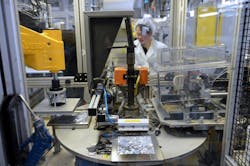How will AI and IoT reshape the way we work in 2030?
Dell Technologies and the Institute for the Future teamed up to explore this in a report "Realizing 2030: A Divided Vision of the Future". Business leaders, 3800 of them around the globe, were asked to gauge their predictions and preparedness for the future.
By 2030, the partnerships between man and machine will become especially close, says Gartner. They will be more immersive than ever and “help us surpass our own limitations. Fueled by exponential increases in data, processing power and connectivity, new possibilities will open up."
So how will all of this affect the way we work? Leaders are unsure. While 50% of business leaders agree that automated systems will free up their time, just as many 50% don’t agree.
Of those that see automation lessen the workload they feel they can offload these areas;
1) Inventory management
2. Financial admin (i.e. invoices, POs)
3. Troubleshooting
4. Logistics/supply chain (i.e. delivery drivers)
5. Administration (i.e. scheduling meetings, data input)
6. Product design
7. Customer service
8. Marketing & communications
9. HR admin (recruitment and training)
10. Medical/health diagnoses
Whether this new working environment will lead to job satisfaction isn't clear either as only 42% believe they’ll have more job satisfaction in the future by offloading the tasks they don’t want to do to machines.
Opinion is also split on whether workers will be more productive due to more collaboration with machines. And only half think they will learn on the job with AR.
However, there is complete agreement on the fact that human and machines will work as integrated teams. More than eight in ten (82%) leaders expect humans and machines will work as integrated teams within their organization inside of five years (26% say their workforce and machines are already successfully working this way
Looking at the future needs of the workforce and how technical skills will fit into this scheme, 56% say schools will need to teach how to learn rather than what to learn to prepare students for jobs that don’t exist yet (corroborating IFTF’s forecast that 85% of jobs that will exist in 2030 haven’t been invented yet) - but 44% disagree.
In conclusion, across the results of the survey, these differing viewpoints could make it difficult for business leaders to confidently prepare for a future that’s in flux.
About the Author
IW Staff
Find contact information for the IndustryWeek staff: Contact IndustryWeek
